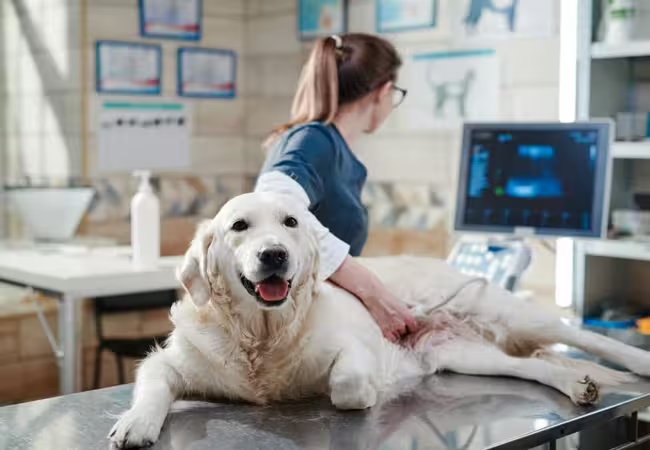Vet’s 2025 Guide: Canine Gastroduodenal Ulcer Disease🩺

In this article
Vet’s 2025 Guide: Canine Gastroduodenal Ulcer Disease🩺
By Dr. Duncan Houston BVSc
💡 What are Gastroduodenal Ulcers?
Gastroduodenal ulcers are erosions or full-thickness wounds in the lining of the stomach or duodenum—often due to excessive acid or weakened protection—leading to pain, bleeding, and possibly perforation.
🚩 Causes & Risk Factors
- 💊 NSAIDs and steroids reduce protective prostaglandins and damage mucosa; even COX-2 inhibitors aren’t risk-free.
- 🧬 Neoplasia (gastric/intestinal tumors, mast cell tumors, gastrinomas) stimulate acid or directly ulcerate lining.
- 🩸 Liver disease decreases mucosal blood flow and alters acid balance—gastroduodenal ulcers found in ~10% of hepatic dogs.
- ⚠️ Other systemic diseases: kidney disease, Addison’s, shock, extreme stress/ exercise.
- 🛑 Foreign bodies or trauma can damage lining and lead to ulceration.
👀 Clinical Signs
- 🤮 Vomiting (often with fresh or “coffee-ground” blood)—most common sign.
- 🩸 Melena (dark tarry stools) if ulcer bleeds.
- ⚠️ Dehydration, drooling, abdominal pain (restlessness, praying pose).
- 😴 Lethargy, weakness, pale gums from blood loss or anemia.
- 🦠 Fever if ulcer perforates and causes sepsis.
🧪 Diagnosis
- History & Exam: focus on medication use, exercise history, palpation, rectal exam for melena.
- Bloodwork: CBC (anemia, melena), biochemistry, albumin, creatinine, liver panel.
- Imaging: Abdominal ultrasound is preferred; ultrasound can detect wall thickening, masses, perforation signs.
- Endoscopy: Allows visual confirmation and biopsy—gold standard.
- Contrast radiographs: helpful for perforations or obstruction.
- Work-up systemic disease: liver, kidney tests, endocrine screening as suspense of underlying condition.
🛠 Treatment
1. Medical Management
- 💊 Discontinue ulcer-causing drugs (NSAIDs, steroids)
- 🔥 Acid reduction: Use proton pump inhibitors (omeprazole) or high‑dose H₂ blockers (famotidine, ranitidine).
- 🛡️ GI protectants: sucralfate to coat ulcers.
- 💉 Supportive care: IV fluids, antiemetics, plasma/protein replacement if needed.
- 🧪 Antibiotics: if perforation or systemic infection suspected—broad-spectrum pending culture.
2. Surgical Intervention
- ✂️ Emergency surgery for perforated ulcers or hemorrhage, with debridement and closure.
- 🔧 Mass removal if tumor identified via biopsy.
3. Address Underlying Disease
- 🔄 Manage liver, renal or endocrine disorder to reduce recurrence.
- ⚕️ Treat cancers, gastrinomas, and mast cell tumors as indicated.
📈 Prognosis & Follow-Up
- 🟢 Favorable in superficial/mild cases with treatment—improvement in 5–7 days.
- 🟡 Guarded if perforation, large bleed, or underlying systemic disease present.
- 🔴 Serious risks include perforation, sepsis, shock, and anemia.
- 📅 Monitor: repeat bloodwork, imaging or endoscopy every 4–6 weeks until healed; long-term management if systemic disease.
🏡 Ask A Vet App Home‑Monitoring Tools 📲🐶
- 📆 Set medication reminders: acid‑blockers, protectants, antibiotics.
- 📊 Log vomiting frequency, stool type, appetite, and water intake.
- 📷 Upload photos of vomit/stool or abdominal distention.
- 🔔 Alerts if black stools, repeated vomiting, lethargy or no appetite.
- 📚 In‑app guides for diet transitions, medication administration & recognizing worsening signs.
🔑 Key Takeaways 🧠✅
- Gastroduodenal ulcers result from acid damage and reduced mucosal protection.
- Causes include NSAIDs/steroids, neoplasia, liver/renal disease, stress, and foreign bodies.
- Signs: vomiting (with or without blood), melena, abdominal pain, lethargy.
- Diagnosis: history, bloodwork, ultrasound, endoscopy, biopsy.
- Treatment: stop causative medications, acid suppression, protectants, surgery if needed.
- Prognosis is good if mild; more guarded with complications or systemic disease.
- Ask A Vet empowers owners with tracking, reminders, and on‑demand vet collaboration.
🩺 Final Thoughts ❤️
In 2025, managing gastroduodenal ulcers in dogs combines early detection, targeted diagnostics, tailored medical/surgical treatment, and empowered home care. With tools like Ask A Vet, owners can actively monitor symptoms, adhere to protocols, and alert veterinary teams early—enhancing recovery and preventing severe complications 🐾✨.
Visit AskAVet.com and download the Ask A Vet app to log symptoms, schedule meds and follow-ups, upload imagery, get alerts for worrying signs, and connect instantly with your vet through treatment and recovery. 📲🐶






